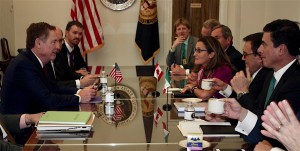
U.S. Trade Representative Robert Lighthizer, left, talks with Canada's Chrystia Freelander and Mexico's Ildefonso Guajardo, both right.
Without the North American Free Trade Agreement, the auto industry in the United States, Mexico and Canada would find it difficult to meet the future challenges from manufacturers from Asia and Europe in building the next generation of motor vehicles.
Certainly the current agreement needs to be modernized panelists said during a discussion on NAFTA during the Automotive News World Congress. “It was written even before there was an internet,” said, Thomas “Mack” McLarty, the former aide to President Bill Clinton, who helped guide NAFTA through Congress in 1993.
McLarty noted that the NAFTA negotiated under President George H.W. Bush and was approved under President Clinton with help of major blocs of votes from both Democrats and Republicans. “This is a tough decision politically. But it is very straight forward in terms economic security,” he said.
The NAFTA agreement has benefitted all three countries. added McLarty, who said job loss from technological changes has been far greater than from U.S. trade with Canada and Mexico.
Oscar Albin, president of an association of Mexican auto parts suppliers, also emphasized that NAFTA is important to carmakers and suppliers in all three countries.

Flavio Volpe, the president of the Automotive Parts Manufacturers Association of Canada, said no one is well served by "scuttling" the talks.
“The reality is to make North American auto industry strong, Canada and the U.S. need Mexico,” added Albin, who said companies based in the U.S. benefit competitively from the lower production costs in Mexico.
(GM’s Barra optimistic about NAFTA; not pulling Silverado from Mexico. Click Here for the story.)
“Japan and Korea have Thailand, Malaysia and the Philippines. Europe has Eastern Europe and Tunisia and Morocco,” he said. “Without Mexico’s low wages, we will lose our manufacturing to Asia and Europe.
“For the (manufacturers) between Europe, Asia and the United States is it is a race to see who is going to win the to make the next generation of cars. We really have to focus on the problem. We’re going to lose the opportunity.”
Albin added the NAFTA region now exports some 4 million units to other parts of the world. “Exports were much smaller 25 years ago,” he said.
Despite NAFTA’s economic importance, the negotiations upon which the Trump Administration insisted, aren’t going very well. In fact, the Canadians think there is a 50% chance the talks will ultimately fail.
“We are not doing a very good job. Seven months ago we started, instead of solving problems we are creating new ones,” he added.
(Click Here for more about the rise in Mexican imports in 2017, despite Trump pushback.)
“We all have our arsonists,” and it doesn’t help anybody to scuttle the negotiations, said Flavio Volpe, the president of the Automotive Parts Manufacturers Association of Canada.
Robert Wildboer, executive chairman of Martinrea International Inc., which is based in Canada but has major investments in all three NAFTA countries, described the current agreement is wonderful system but the industry has not done a very good job in spelling out the economic implications for the auto industry of scrapping NAFTA, which is something the Trump Administration has considered.
“I think from that background it’s very important for the industry to be very vocal,” he said. “We need NAFTA. At the end of the day the health of this industry is very important to the U.S. We have costs that will go up and we’ll have fewer jobs and the U.S. will lose more jobs than anyone else,” he added.
Scrapping NAFTA could also become a major problem for U.S. agriculture.
“We are working very hard to have an agreement with Brazil and Argentina that’s not going to be well received in the United States,” McLarty said. “I think President Trump deserves credit for tapping into the concern over jobs and moving plants. I think we have got to a much better job on placing workers on new jobs and worker retraining.
(To get the latest on NAFTA negotiations, Click Here.)
“However, pulling out of NAFTA would weaken U.S. national security. If you pull back, it has repercussions on other countries,” who may no longer regard the U.S. as a reliable ally or a country capable of keeping its word, McLarty said.
